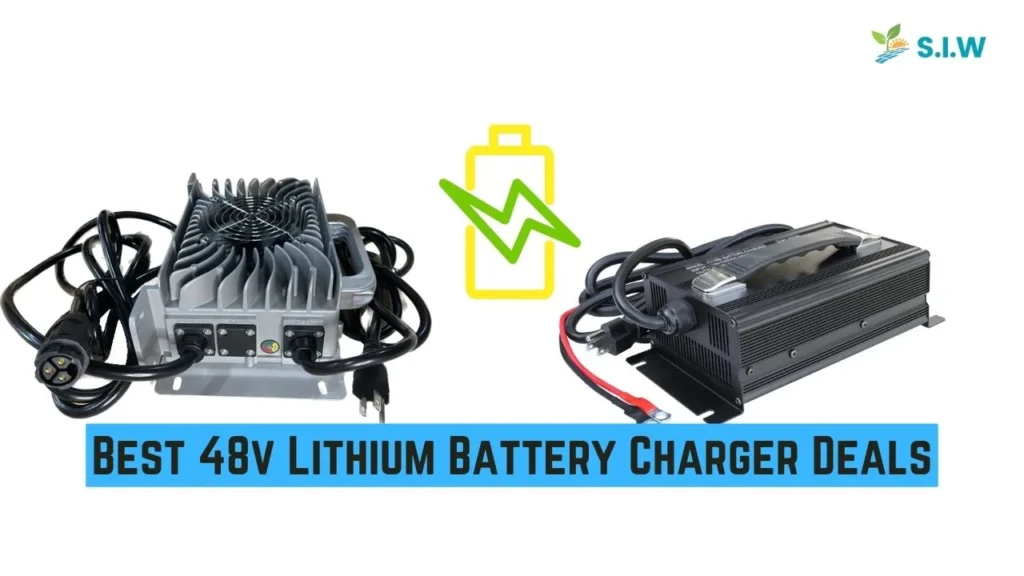Investing in a reliable 48v lithium battery charger for your solar power setup can significantly enhance energy storage and efficiency, supporting a continuous and sustainable energy supply. The lithium battery chargers available today vary in features and specifications, impacting performance, charging speed, and longevity. This guide provides insights into the best 48v lithium battery chargers for solar energy, their benefits, features to look for, and essential FAQs to inform your purchase.
Why Choose a 48v Lithium Battery Charger for Solar Power?
Lithium battery chargers specifically designed for 48v systems are compatible with various solar applications, from residential setups to commercial installations. They are durable, compact, and highly efficient in managing energy transfer, maximizing stored energy for off-grid or hybrid solar power systems.
Key Benefits of 48v Lithium Battery Chargers for Solar Applications
- Efficiency: 48v lithium chargers allow quicker charging cycles, essential for renewable energy applications where sunlight availability varies.
- Longevity: Lithium batteries charged with the correct 48v charger offer a longer life cycle, minimizing maintenance.
- Compact Design: These chargers are often compact, fitting easily into solar setups with limited space.
- Advanced Safety Features: Quality 48v chargers come equipped with safety features like overcharge protection, short circuit prevention, and temperature control.
Top Features to Consider in 48v Lithium Battery Chargers for Solar
When selecting a 48v lithium charger for solar use, prioritize features that contribute to long-term performance and reliability. Here’s a detailed breakdown of essential features.
1. Charging Speed and Power Output
- Opt for chargers with higher amperage as they reduce charging times, especially for large battery banks. Chargers with smart charging technology also optimize energy flow, adjusting output based on battery needs.
2. Smart Charging and Battery Management Systems (BMS)
- A quality Battery Management System (BMS) in the charger monitors temperature, voltage, and current, preventing overcharging and overheating. Smart charging improves battery efficiency and extends its lifespan.
3. Solar Compatibility and Flexibility
- Chargers with MPPT (Maximum Power Point Tracking) compatibility are ideal for solar setups as they track and optimize the maximum power available from solar panels. Look for chargers adaptable to different energy sources.
4. Build Quality and Durability
- Since solar setups often experience environmental variations, choosing chargers with robust, weather-resistant casings is beneficial for maintaining longevity. Stainless steel or aluminum alloy casings with IP-rated protection against dust and moisture enhance durability.
5. Efficiency and Energy Loss Reduction
- High-efficiency chargers (90% and above) reduce energy waste, providing more stored energy for consumption and less loss during charging. Look for models that advertise minimal energy dissipation.
6. Safety Mechanisms
- High-quality 48v lithium chargers should include overcharge, overheating, and short-circuit protection. Automatic shutoff functions are essential for unattended charging.
Recommended 48v Lithium Battery Chargers for Solar Power
1. Victron Energy Blue Smart IP67 Charger 48v
- Key Features: Waterproof (IP67 rated), adaptive 5-step charging algorithm, Bluetooth monitoring.
- Benefits: Delivers a high-efficiency charge, optimized for lithium batteries, durable in outdoor conditions, suitable for large solar setups.
2. Renogy 48v 20A DC-DC Battery Charger
- Key Features: Multi-stage charging, compatibility with multiple battery types, MPPT charging capability.
- Benefits: Ideal for solar setups requiring efficient charge control, excellent for RVs and off-grid use, supports a wide range of power inputs.
3. PowMr MPPT 48v Solar Battery Charger
- Key Features: Built-in MPPT for optimal solar charging, adjustable charge settings, durable aluminum casing.
- Benefits: Maximizes energy efficiency from solar panels, robust and reliable for solar installations in remote or varied climates.
FAQs
1. Why is a 48v lithium battery charger recommended for solar systems?
A 48v lithium battery charger is efficient for higher capacity systems often needed in solar setups. It supports optimal energy transfer from solar panels, reducing charge times and enhancing energy availability.
2. Can I use a 48v lithium charger for other battery types?
While some 48v chargers are compatible with different batteries (such as AGM or lead-acid), using them with lithium batteries is best for efficiency and longevity. Check the specifications to ensure compatibility with other battery types.
3. What is the average charging time with a 48v lithium battery charger?
Charging time depends on the charger’s amperage and battery capacity. On average, a high-amperage charger can fully charge a standard lithium battery in 4-6 hours. However, this may vary based on environmental factors like sunlight availability in solar setups.
4. How does MPPT in 48v lithium chargers benefit solar applications?
MPPT (Maximum Power Point Tracking) technology maximizes power extracted from solar panels, adjusting the output to match the battery’s needs, especially during varying sunlight conditions. This efficiency ensures a consistent charge rate.
5. Is a battery management system (BMS) essential in a 48v lithium charger?
Yes, a BMS is critical as it ensures safe charging by monitoring and regulating voltage, current, and temperature, protecting the battery from damage.
6. What are the benefits of waterproof and dustproof features in lithium chargers?
Waterproof (IP67) and dustproof chargers offer additional protection for solar installations, especially those exposed to outdoor environments. This protection extends charger life and minimizes maintenance needs.
A high-quality 48v lithium battery charger designed for solar applications can significantly enhance energy storage efficiency, durability, and overall sustainability. Ensure your selection meets the technical requirements, safety standards, and environmental compatibility for the best performance in your solar power system.








